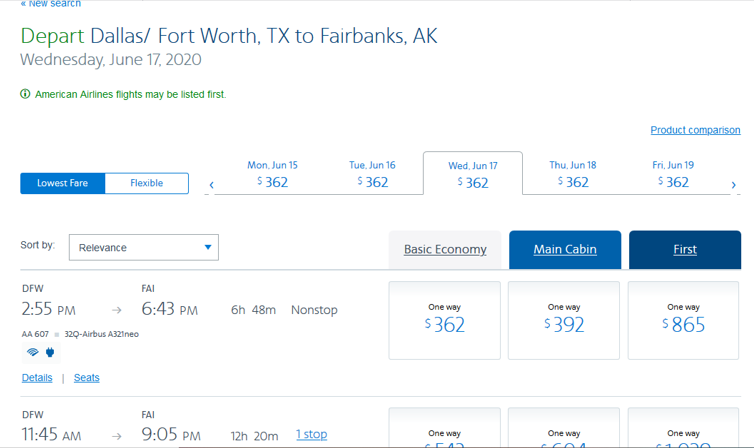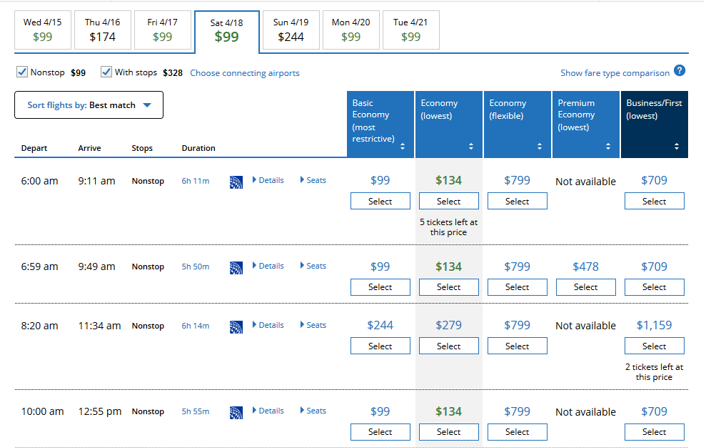Nearly all domestic airlines recently announced coronavirus change fee waivers, as Scott detailed yesterday. What is the real idea behind these waivers, though? Is it a rare example of airline generosity, or just a cynical marketing ploy?
Coronavirus Airline Change Fee Waivers: A Clever Alternative to Discounting
Clearly, airlines are in a state of panic about flight demand dropping like a stone due to coronavirus fears. United announced yesterday significant schedule cuts and a hiring freeze, for example. Normally, such a drop in demand triggers deep discounting. This time, though, I’m seeing little movement in terms of pricing. I’ll provide two examples. The first is an American nonstop from Dallas to Fairbanks in June, a flight I’ve watched for several months. It’s consistently priced at the exact same level the entire time – $392 in Main Cabin.
I also recently booked United’s new Premium Plus from Newark to Los Angeles next month. (Naturally, five days before United announced their change fee waiver.) I paid $478 for the flight, the price still charged today.
So to that end, these fee waivers seem like a clever way to discount without actually discounting. It’s likely that airlines currently face a significant downturn in advance bookings. Without advance bookings, there’s no cash. But if you allow prospective customers to “book with confidence”, maybe they’ll take the chance. The gambit here is that the lost change fee revenue works out to less than the revenue lost from discounting. And maybe spur bargain hunters to book now rather than waiting for prices to drop.
So will it work? Well, maybe. I’ll freely admit I’m intending to book our Alaska tickets now; I originally planned to wait another month or so. I might also pull the trigger on tickets to India next January. Change fees on international tickets often run even higher than $200; our dates are pretty set, but it’s nice to have no fee as a fallback in case we switch a day or two forward or back.
A Cynical Ploy Under the Guise of Generosity
Where I take issue, though, is the airlines trying to pat themselves on the back for their generosity. Buzzwords like “book with confidence”, “offering flexibility”, “ensure the safety and welfare of customers”, etc. abound. Yet if that’s really true, why not extend the waiver to tickets booked prior to March 1st? Let’s take two sample passengers. The first bought a ticket to Rome back in December for next month, before the coronavirus crisis hit. The second decides to buy one now, knowing about the virus, thanks to the fee waiver. If Rome decides to shut down all of its public monuments later this month, both travelers are SOL. Yet the first has to eat a $200+ change fee, while the second receives a waiver. That doesn’t seem fair.
Look, I get the challenges the airlines face. It’s 100% understandable to want to goose advance bookings. They need to make money, and waiving change fees is a clever alternative to slashing fares. But this just seems like a woefully incomplete approach. Canceled meetings and concerts, closed public venues, etc. render many trips pointless. Yet travel insurance rarely covers such situations, unless the State Department issues a “Do Not Travel” warning. For that matter, I voluntarily postponed my round-the-world award trip from May to November. (My mother would kill me if I went through with it. No, really. She would.) I ended up eating $450 of change/redeposit fees in the process. This is a trip I booked last summer, in good faith. Yet I can theoretically book the same trip with United today and escape all fees if I change my mind. That seems to unnecessarily punish those who planned ahead.
Final Thoughts
Don’t get me wrong, I appreciate the latest round of fee waivers, and plan to take advantage myself. But like Scott, I hope the airlines reconsider change fees for already booked tickets. In the meantime, if you find yourself with a canceled meeting or event, call the airline and ask nicely. You might get lucky.







